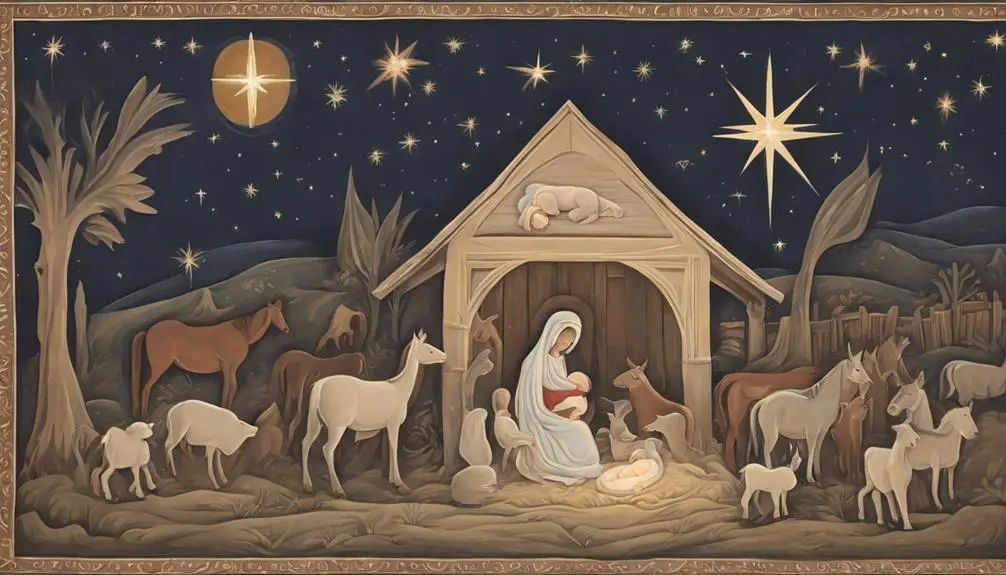Behold the transformative power of small beginnings in biblical narratives, revealing hidden lessons in unexpected origins.

Examples of Small Beginnings in the Bible
In the grand tapestry of the Bible, you'll find numerous stories that seem to start in the most humble or unexpected places. Think about David, a mere shepherd boy who ascended to be a king, or Moses, found in a basket and later leading his people to freedom. Ruth, Joseph, Esther, and even Jesus himself, all had beginnings that could be considered small or insignificant.
But what if, within these narratives, there's a larger message about the power and potential of small beginnings? Wouldn't you be intrigued to unearth these profound lessons hidden in plain sight?
Key Takeaways
- The Bible offers numerous instances of individuals, like David and Moses, rising from humble beginnings to positions of greatness.
- Faith in action and divine guidance are recurring themes, as seen in the stories of Moses, Ruth, and Esther.
- Humility, courage, and wisdom are common themes found in these Biblical figures' transformations from small beginnings to significant roles.
- Divine orchestration is evident in these stories, showcasing how seemingly insignificant beginnings can lead to impactful lives and purposes.
David: The Shepherd King

Despite his humble beginnings as a shepherd, David's journey to kingship is a profound testament to the power of faith and divine favor, which you'll discover as we delve into his compelling narrative. David's humility, a trait developed during his shepherd days, didn't wane even when he ascended to the throne. His leadership mimicked his shepherd's role, guiding and protecting his people, much like a shepherd does his flock.
In analyzing David's shepherd leadership, one can't ignore his skill in balancing justice and compassion, honed by his pastoral life. His experiences gave him the wisdom to understand the importance of fairness, yet the empathy to extend mercy. This dynamic combination made him a revered king, respected and loved by his people.
The tale of David's rise from a shepherd to a king underscores the transformative power of faith and God's favor. It's a story that highlights how one's humble beginnings, coupled with humility and faith, can lead to greatness. David's life is a testament to the concept that true leadership isn't about power, but about serving and guiding others, just as a shepherd does with his flock.
Moses: From Basket to Deliverance

In a similar vein to David, Moses' journey from a simple basket in the Nile to becoming the deliverer of the Israelites epitomizes the formidable influence of divine guidance and unwavering faith. His basket upbringing was an initial phase of obscurity, yet, it set the stage for his divine appointment. Found and raised by Pharaoh's daughter, Moses was unknowingly being prepared for his deliverance leadership.
His interaction with God in the burning bush was a turning point, where he received the divine mandate to lead the Israelites out of Egyptian bondage. Despite his initial hesitations, Moses' faith and obedience to God's will set him apart. You see, his deliverance leadership wasn't a product of his own making, but of divine orchestration.
Moses' humble beginnings in a basket and his rise to deliverance leadership serve as a testament to God's ability to use the ordinary for extraordinary tasks. This narrative illustrates how God works through small beginnings, using them as stepping stones towards monumental feats. It's an affirmation that your beginnings, no matter how small or insignificant they may seem, can lead to great things when guided by faith and divine purpose.
Ruth: From Moabite to Matriarch

Transitioning from the narrative of Moses, we now turn our attention to Ruth, whose transformation from a Moabite widow to a revered matriarch showcases another remarkable instance of humble beginnings leading to extraordinary outcomes. Ruth's journey, saturated with Moabite customs, portrays an individual's potential to transcend cultural norms and establish a new legacy.
The tale of Ruth, a foreigner in a strange land, commences with loss and poverty. Yet, even in this lowly state, she's ingrained with qualities of loyalty and integrity. Ruth's adherence to her mother-in-law, Naomi, despite the scarcity and uncertainty, is a profound expression of her unyielding commitment. It's this unflinching loyalty that sets the stage for her ascension.
Ruth's subsequent marriage to Boaz, a man of standing, doesn't merely secure her future but positions her as an Ancestral Matriarch in the lineage of King David, and eventually, Jesus Christ. Here, Ruth's personal transformation becomes interwoven with the broader narrative of divine providence.
Thus, Ruth's narrative isn't just a tale of personal elevation, but a testament to the potential of small beginnings, the power of loyalty, and the transformative capacity of divine orchestration. It's a story that calls you to acknowledge that even from a humble start, greatness can emerge.
Joseph: Dreamer Turned Ruler

Moving from Ruth's extraordinary journey, we now turn our gaze towards Joseph, whose own humble origins as a dreamer shepherd boy culminate in a position of extraordinary power and influence in Egypt. An analysis of Joseph's journey reveals not only how he rose from obscurity to prominence but also how he utilized dream interpretation and ruler strategies to navigate the complex socio-political landscape of ancient Egypt.
- Dream Interpretation: Joseph's ability to interpret dreams became his passport from the prison to the palace. His accurate interpretation of Pharaoh's dreams demonstrated the divine wisdom he possessed.
- Ruler Strategies: Upon interpreting Pharaoh's dreams, Joseph proposed a strategic plan to store grain during the seven years of abundance to prepare for the seven years of famine. This strategy showcased his foresight.
- Leadership Skills: Joseph's administration during the famine years was marked by efficiency and effectiveness, ensuring Egypt's survival.
- Reconciliation: Joseph's ultimate act of forgiving his brothers demonstrated his emotional intelligence and maturity.
Esther: Orphan to Queen

Shifting our focus from Joseph's rise to power, let's delve into the remarkable story of Esther, an orphan who ascended to the throne as queen, highlighting her strategic maneuvering in a politically charged environment. Esther's narrative is a perfect example of Orphan Empowerment in the Bible. She was a Jewish orphan who was raised by her cousin Mordecai in Persia.
Despite her humble beginnings, Esther's influence was immense. She used her position as queen to save her people from genocide, showcasing her courage and wisdom. Esther's story emphasizes that no matter how small or insignificant one might seem, they can still make a significant impact.
To illustrate Esther's influence and orphan empowerment, let's consider the following table:
Esther's Traits |
Impact |
|---|---|
Humility |
Won the favor of the King and the people |
Courage |
Saved her people from genocide |
Wisdom |
Strategically maneuvered political situations |
Esther's story is a testament that small beginnings can lead to great influence. Her rise from orphan to queen shows that one's origin does not determine one's destiny. Esther's life is a beacon, illuminating the possibilities that arise when one embraces their individuality and potential, even amidst adversity.
Jesus: Birth in Bethlehem

In the grand tapestry of biblical narratives, your attention may be drawn to the humble birth of Jesus in Bethlehem, a significant event that underpins Christian belief and showcases the profound impact of small beginnings. The narrative of Jesus' birth is rife with elements of the miraculous, the prophetic, and the seemingly insignificant, all conspiring to create a momentous event.
- The Manger Miracle****: Jesus wasn't born in a palace or a grand structure but in a humble manger, indicating God's favor doesn't depend on earthly wealth or status.
- The Star Prophecy****: The star that guided the Wise Men to Jesus is a symbol of divine guidance and purpose, emphasizing that God's plans often surpass human understanding.
- The Shepherds**: Lowly shepherds were the first to receive the news of Jesus' birth, rather than influential figures, showing God's favor isn't limited to the powerful.
- Mary and Joseph**: They were ordinary people entrusted with an extraordinary task, demonstrating that God often uses the ordinary to accomplish the extraordinary.
Your understanding of these elements deepens the significance of Jesus' birth in Bethlehem. It's a testament to how God uses small beginnings to unfold His grand design.
Frequently Asked Questions
What Are Other Lesser-Known Examples of Small Beginnings in the Bible?
You're seeking lesser-known instances of small beginnings in the Bible. Consider 'Seed Faith Interpretations.' Here, small seeds of faith lead to greater spiritual growth.
Then there are 'Prophetic Small Beginnings,' like Samuel's humble start before becoming a major prophet. These examples illustrate the Bible's theme that great things often originate from small, seemingly insignificant starts.
It's a reminder that major impacts can stem from humble origins.
How Do These Stories of Small Beginnings Relate to Modern Christian Life?
In your modern Christian life, stories of small beginnings offer personal growth reflections. They teach you Biblical humility practices, reminding you that even small steps matter.
You learn that God values humble beginnings, which can lead to great outcomes. It's a journey of faith and patience, mirroring those Biblical narratives.
These stories inspire you to persevere, knowing that your small acts of faith can have significant impacts, just as they did in the Bible.
What Is the Theological Significance of Small Beginnings in the Bible?
You're exploring the theological significance of small beginnings in the Bible.
It's key to understand that they signify Divine Intervention. God often uses humble starts to manifest His power and glory.
This demonstrates that faith doesn't require grandeur but sincerity and commitment.
These small beginnings relate to faith by teaching you to value the small steps in your spiritual journey, trusting in God's plan and timing.
Are There Any Parables or Teachings of Jesus That Specifically Talk About Small Beginnings?
Yes, you'll find teachings about small beginnings in Jesus' parables. Consider the Parable of the Mustard Seed. It starts as the smallest seed but grows into a large tree. This parable's interpretation highlights growth symbolism, conveying the kingdom of God's humble beginnings and exponential growth.
Such teachings underscore that great outcomes can emerge from small, seemingly insignificant starts, a theme you'll encounter repeatedly in Jesus' teachings.
How Do These Stories of Small Beginnings Reflect on the Concept of God's Grace and Redemption?
In understanding God's grace and redemption, you'll find 'Grace in Humility' and 'Redemption through Smallness' as key principles. Essentially, they convey that even the smallest acts, when done in humility, can lead to divine grace.
Similarly, redemption isn't always grand; it often begins small and gradually unfolds. These concepts help you comprehend how God's grace works in mysterious ways, often starting with things seemingly insignificant yet leading to profound transformation.
Conclusion
So you see, the Bible is rife with tales of humble beginnings leading to extraordinary destinies. From David's pastoral start, Moses' riverbed rescue, Ruth's foreign origin, Joseph's dream-filled youth, to Esther's orphaned childhood, and Jesus' humble birth – all were precursors to greatness.
These narratives serve as timeless reminders that small starts can lead to mighty finishes, reinforcing the belief that God often uses the ordinary to accomplish the extraordinary.



Sign up